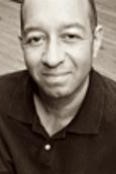“Fame only destroys a poet if the poet lacks clarity.”
CARL PHILLIPS
Interviewed By: Kaveh Akbar
Donne seems to be a poet with whom you’ve a certain kindredness -- critics frequently point to his explorations of the metaphysics of desire and morality when discussing your own. If you could somehow share just one of your poems with him, if you really wanted to impress him, which would it be?
I certainly wouldn't think to be able to dazzle someone like Donne, but perhaps I could amuse him by showing him my book Riding Westward, given that its title comes from his poem "Good Friday, 1613. Riding Westward." I hope he would see that I mean it as an homage.
You've talked about your “resistance to accept that there are some questions that can't be finally, absolutely answered.” This sentiment fascinates me, and it's clear you're grappling with these kinds of unresolved questions throughout your work. From “Blue”: “Under the night, somewhere / between the white that is nothing so much as / blue, and the black that is, finally; nothing, / I am the man neither of you remembers.” From the “Snow Globe”: “I keep / pretending it makes no difference when the moon / goes that do-what-you-must shade of red that there's / no real name for. As for how it feels, or / can sometimes: like a life, like life / itself, descending.” How much of your work, then, performs a sort of psychic tidying up as you're writing it? Moments like these read like you've popped the hood and are letting us watch you poke around.
For me, all poetry is a way of bringing together psychological and emotional shards that, when brought together, seem to point to something like a way to move forward, or to at least understand where one has been, and maybe learn something from that. I don't think of poetry as therapy, but it certainly has been a space, for me, where I can wrestle with ideas and demons and, for a moment, lay them to rest.
You’re a fairly prolific poet, with eight collections published since 2000. To what extent does this output represent your needing to, as you said, wrestle with these ideas and lay them to rest? To what extent is it a function of a disciplined writing schedule?
I used to have a writing schedule many years ago, where I would try to block out Sunday morning for writing, but that no longer happens. I have no writing schedule at all, and just try to jot thoughts and lines down on the fly when I can. Then, there's usually some night where I feel I could write if I just sat down with all the notes. Sometimes a poem results, sometimes not. I would say I write about two poems a month, with luck. I'll add, though, that I don't spend a lot of time doing the things many poets seem to do, social media, etc., and I'm a pretty private person. I spend a lot of time alone in my head, which is conducive to getting thinking done, I find.
Jack Gilbert wrote, “All poets are destroyed by fame. Without exception.” As a kingmaker of sorts in your role judging for the Yale Younger Poets Prize as well as sitting on the panel for the Kingsley Tufts Poetry Prize, can you talk about the benefits of such programs? The exposure granted to unknown poets by the former and financial security provided by the latter seem like unassailable Good Things, but I'm more interested in the ways such prizes can support the future work by recipients. (It's worth noting that Gilbert was a Yale Younger poet and Pulitzer nominee himself, so he made his statement with an appropriate measure of irony.)
I think fame only destroys a poet if the poet lacks clarity about himself or herself, in terms of being a flawed human being like everybody else. If you can win a prize and remember that it has nothing to do with whether you're any good or not as a writer, then you will be able to keep in perspective what really matters, i.e., the next poem. Sometimes prizes coincide with talent, that's certainly the idea, but always there's something like luck involved. And, when working with a group of judges, there are often politics to be negotiated, which is disheartening, but sometimes inevitable.
You worked on a well-regarded translation of Sophocles's Philoctetes. How did this project come about? Was the decision to accentuate “the frequent and radical shifts in line length throughout,” which one critic called the “most salient feature of your translation,” inspired at all by your own personal poetic aesthetic?
Peter Burian and Alan Shapiro decided to do a series with Oxford, where poets and scholars would be teamed up to translate various Greek plays. I was assigned Philoctetes -- it wouldn't have been my first choice, though in the end I think it was the perfect match for me. Since I knew Greek already, I didn't turn to the scholar very much, I simply sat down and did a rough translation, word for word, in a week. After that, I tried to hear what the rhythms might be -- I actually took the translation to the beach in winter several times, listening to the surf, keeping in mind that Philoctetes takes place on an island. I hope I managed to convey something Sophoclean, but certainly my thoughts about lineation influenced my choices. It seems a way to bring something new to the text, without compromising the actual content.
You mention already knowing Greek -- can you talk about how your background in philology has informed your own poetry?
I feel I truly came to understand English grammar and syntax by having to learn other languages. It's how I came to appreciate the sentence, and sentences have been the crucial element in pretty much all of my poems.
It’s interesting you say that -- manipulation of the English sentence is certainly one of the signature flourishes of your work. Jonathan Farmer writes: “Phillips has a gift for making a sentence into a dramatic act, relentlessly unfolding some new and sometimes contradictory significance just beyond the next pause, so that the destructive offices of time and vulnerability also become a creative force.” Can you talk about the way you conjure these sorts of sentences, what actually goes on from a craft standpoint to build a line like, “If the sea could dream, and if the sea / were dreaming now, the dream / would be the usual one: Of the Flesh.”
That line you quote is literally a line that just came to me when I was sitting at a window in Missouri, and thinking of the sea back east. I had no idea what to do with it -- an example of something getting jotted down, and then later it became the opening for a longer sequence. I don't really know how to conjure a sentence, truly, though I know that answer sounds naive or even lame. I write the way I think, which has always been somewhat roundabout.
Well, the effect created is unmistakably your own. The long, interrupted sentence, the recurring themes of eroticism, power, and morality (often all at once)... A line like “Scattered soot, by which the myth you made for yourself, / before at last becoming the myth, has sometimes been / more easily understandable – but sometimes not – there's / no one now; look away,” could only be a Carl Phillips line; if it were placed in a line-up with a hundred other lines from a hundred other contemporary poets, I (and most of your readers, I imagine) could still pick it out as being yours. To what extent is this the result of a conscious effort on your part to maintain a consistent voice throughout your work?
I've never made a conscious effort, when it comes to voice or subject matter. I feel that all poems are a reflection of each poet's sensibility, we think the way we think, and it gets translated onto the page.
You've written “the self seems increasingly to be understood as a construction of many identities.” Writing as a black gay male, can you talk about the role that “many-sidedness” plays in your poetry, in terms of the ways you write about identity? It strikes me that you might relate to what William Meredith wrote of Robert Hayden -- “he would not relinquish the title of American writer for any narrower identity.”
I think even being called an American poet is too narrow. If I look around at all the manifestations of being American, just here in St. Louis, I can honestly say there's no single good answer. And the same goes for black and gay. I know many gay men who are nothing like me, I know many black people who aren't professors at a well-endowed school -- to what extent do I reflect the gay black experience? I believe I reflect one particular gay black experience, but I don't think it is one that would resonate with a lot of the gay black men in St. Louis. I don't deny any of the labels that people may want to put on me, I just don't think it should be narrowed down to two or three. What about poets with dogs? What about poets who are raising a family? These kinds of things also shape identity. As does economic background. As does regionality.
Interview Posted: September 29, 2014
MORE FROM DIVEDAPPER. (Drag left)





















































































